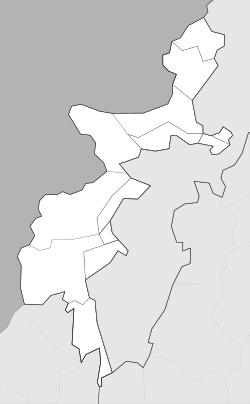Dande Darpakhel | |
|---|---|
| Coordinates: 32°59′18″N70°3′5″E / 32.98833°N 70.05139°E | |
| Country | |
| Territory | Federally Administered Tribal Areas |
| District | North Waziristan |
| Tehsil | Miran Shah |
| Population | |
• Total | 0 |
| Time zone | UTC+5 (PST) |
Dande Darpakhel is a village in the North Waziristan District of Bannu Division in the Khyber Pakhtunkhwa province of Pakistan. It is a suburb of Miranshah.
The village has been the target of a number of US drone strikes, one of which, in November 2013, killed the emir of Tehrik-i-Taliban Pakistan, Hakimullah Mehsud. [2]
As of the 2017 Census of Pakistan, Dande Darpakhel has 0 inhabitants. [1]


